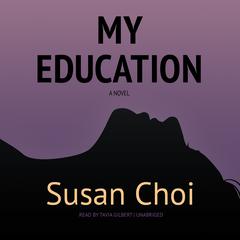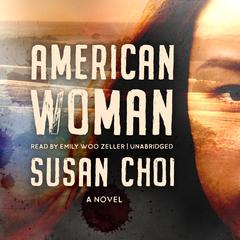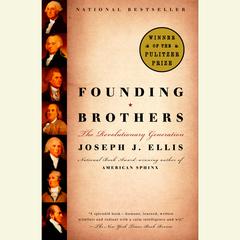 Play Audiobook Sample
Play Audiobook Sample
A Person of Interest: A Novel Audiobook
 Play Audiobook Sample
Play Audiobook Sample
Quick Stats About this Audiobook
Total Audiobook Chapters:
Longest Chapter Length:
Shortest Chapter Length:
Average Chapter Length:
Audiobooks by this Author:
Publisher Description
With its propulsive drive, vividly realized characters, and profound observations about soul and society, Pulitzer Prize–finalist Susan Choi's novel is as thrilling as it is lyrical, and it confirms her place as one of the most important novelists chronicling the American experience.
Lee is a math professor at a second-tier university in the Midwest. When a mail bomb goes off in the office of the star computer scientist next door, Lee is slow to realize that students and colleagues have begun to suspect that he's the Brain Bomber, an elusive terrorist whose primary targets appear to be academic hotshots.
In the midst of campus tumult over the bombing, a letter arrives from a figure in Lee's past, which forces him to revisit events and choices that shaped his failed marriage, his life as a father, and his work as a scholar of middling achievement. While Lee becomes further ensnared in the FBI's attempts to find the bomber, the churned-up regrets from his past bring him to an examination of extremes in his own life as he tries to exonerate himself, face his tormentor from his past, and atone for his failings.
Intricately plotted and psychologically acute, A Person of Interest exposes the fault lines of paranoia and dread that have fractured American life and asks how far one man must go to escape his regrets.
Download and start listening now!
"this is jhumpa lahiri meets zadie smith (look what you've done, jhumpa and zadie! turned a whole generation of women novelists to your stark, in the former case, and bleakly humorous, in the latter, demolition of the multiple barriers the human psyche erects to keep itself looking normal) meets dostoevsky. seriously. what a tour de force. susan choi takes the concept of "scene" so seriously that her scenes turn into long long chapters, even when all she describes is a trip from home to campus. the scope is definitely 19th century. this is writing that leaves no stone unturned in its analysis of the movements of the human heart (george eliot? flaubert?). but there is also a nabokovian pleasure in delving into perversity and pettiness. except that, since this delving is from the point of view of the close-third-person protagonist, these agonies of disclosure are stained and rotted by self-doubt, self-contempt, and a feverish, pathological loneliness. lee is the most tortured person i've ever met, either in real life or in fiction. at the same time (enter zadie and jhumpa) there are all the hallmarks of post-post-modernity in this novel: immigration, cultural impasses, the horrors of academia, the ungraspability of the constructed self, technology, and, of course, terrorism (the novel starts with and centers on a bombing).i'm just at the 100 page mark. this is not fast going. but wow, susan choi, how could you write this and sleep at night?****now the story is picking up -- lee is a suspect in the bombing -- and while this makes for faster reading, you feel that something is lost (not a bad thing, just a regular loss, one of the losses one gets all the time, every day: hours passing, meals ending, goodbye, goodbye). it was really crazy to see lee at his purest, most solipsistic tortured. now he's got something to be tortured about, and the reader's puzzlement, her... anger? starts being directed elsewhere, i.e. at those brutish FBI people. lee becomes the victim, which makes him likable. sea change! ****wow. i just finished this extraordinary book. more on overall impressions tomorrow. it's a masterpiece. i'm surprised it didn't get nominated for any of those awards they are always so eager to give women of color (no slight in the least bit intended -- choi would totally deserve at least a nomination). what a book. i'm reeling.****what an accomplishment. i don't understand why we don't hear about susan choi at least as much as we hear about jhumpa lahiri. the protagonist of this book, lee, is a late-middle-aged asian man, a math professor in an unnamed mid-western college. and already things get strange, because lee's original country, which he left in his late twenties and which was at the time occupied by a repressive communist regime, is never named either. and the time frame doesn't quite work (or at least it didn't for me). like: his next-door colleague, the guy who gets bombed in the first line of the book, is a computer scientist working with dial-up. in fact, he's a pioneer in computer science. so, this is the very beginning of this book, and you read the words "dial-up:" what do you do? you locate yourself immediately in the nineties. but then the FBI shows up, and they have snap phones. did we have snap phones in the 90s? i don't think so. so you readjust your focus, but also keep your eyes peeled for clues. and suddenly you have cassette tapes... etc.to be sure, choi gives a million time-clues. in fact, she tells us at what approximate age lee graduated from grad school, and what year that was. but i found myself doing the math over and over, and bad as i am at basic arithmetic, i don't typically find myself counting so much in a book. oh wait, it's a book about mathematicians! is that why choi makes us count so much?same goes with space. once lee leaves his little town, the geographical markers are awfully precise, down to interstate turns. but it's as if his town and state, much like his time, were sunk in fog, slightly off, slightly murky, slightly out of sync with the rest of reality (the reader's reality).and this is such a great quality of this book, because it makes it vague and mysterious and, also, makes you pay attention. and pay attention is the thing you must do most when you read this book.which brings me to the what's-this-about question. this book changes aboutness every 100 pages or so. ultimately, i think, it's about love and family, spouses, children, but probably someone else would find the aboutness to be different. these issues are the ones that talked to me. the invisible children that live (more and more noticeably) just under the surface of this novel are its center, and the crotchety and failed fatherhood of lee the very heart of this amazing novel.it's lovely that the protagonist should be an east-asian guy living in the midwest. even though he is hardly ever described in terms of otherness, you, if you are like me, i.e. a white reader, herself an immigrant, have his otherness imprinted on the inside of your cornea at all times. this is vastly helped by the fact that choi dwells SO MUCH on his physicality -- his clothes, his thinness, his age, his scrawny body, his smallness, the fatigue lines on his face, etc. every time she does that, you are forced to see his asian face. and, if you are like me, what you see is a kind of inscrutability (which is racist, but then this book is also about making us question our subtle racism) because you know that's what lee's fellow midwesterners see, and what you'd see if you were one of them.and this is certainly not aided by the fact that, in the book, lee is almost always tongue-tied, paralyzed, terrified, blundering, and horribly self-conscious. also, he makes a point of disdaining the most basic social conventions, and seems entirely out of tune with everyone else, as if he were so shy and misanthropic and self-conscious that he didn't have one thought to spare for anyone but his own agonizing self. so it comes as a surprise when choi goes into flashback mode and you discover than a younger lee was, if not more sociable, capable of passion and, even more surprising, of terrifying outbursts of rage. and this is another lesson of this book: that we don't know each other. we don't know each other's motivations, desires, inner selves, potentialities, and future actions. we can't predict. the only thing we can do is talk, and connect, and try to find out.choi writes amazing prose. i can't wait to read her other books. she's a master."
— Jo (5 out of 5 stars)
Quotes
-
“Choi’s precise, cadenced prose alternates between plain-spokenness and lyrical dazzle. Her long, complex sentences compel us to follow wherever they go, and to admire the quiet authority, at once soothing and gripping, with which they arrive there.”
— New York Times -
“A nuanced consideration of what it means to fit in, and of what we owe to the people around us, A Person of Interest eschews obvious answers. At once a tragedy of character and a tale of suspense, this novel is a seamless integration of the political and the personal, beautifully written and impeccably unsentimental.”
— Laura Miller, Salon, One of the Best Books of the Decade -
“With nuance, psychological acuity and pitch-perfect writing, [Choi] tells the large-canvas story of paranoia in the age of terror and…the cost of failed dreams and the damage we do to one another in the name of love.”
— Los Angeles Times -
“One of the most remarkable novels to have emerged from our age of terror…The sweaty pace of the contemporary thriller complements the quiet tragedy of the older, domestic drama, and through it all runs Choi’s scathing, illuminating scrutiny…Choi remains, more than ever, a writer of interest.”
— Washington Post Book World -
“That it is superbly told is no surprise. That its melodrama comes out as gravely real is due to Choi’s profound rendering of her protagonist’s estrangement in an estranged society, and even to the slow and hard-going detail with which she has established it.”
— Boston Globe -
“Choi’s reflections from Lee’s gruffly brittle point of view are as intricate and penetrating as the shifting intrigue surrounding the bomb. The result is a magisterial meditation on appearance and misunderstanding as it plays out for Lee as spouse, colleague, exile and citizen.”
— Publishers Weekly (starred review) -
“[Dunne] grasps the stomach-twisting emotions of the usually reserved teacher and subtly delivers his underlying turmoil. Dunne also masterfully delivers the twang of a grad-school friend the professor betrayed and the no-nonsense approach of investigators.”
— Booklist
Awards
-
A 2009 PEN/Faulkner Award Finalist
-
A Salon Magazine Best Book of the Decade
A Person of Interest Listener Reviews
-
" This is a highly interesting and extremely well-written book, fast-paced except in a few rare places which I admit could have been cut down. One of the most compelling things is that the plot is actually based on real-life events, most importantly the story of Ted Kaczynski, a PhD Mathematician, social critic and Professor at Berkeley University of California who eventually became a terrorist known as the 'Unabomber'. As a result of his Marxist-inspired beliefs, Kaczynski slowly began to reject technological advances as contrary to human progress, since those advances could be used for violent and even lethal purposes, as exemplified by the advent of the nuclear bomb during World War II. The only way forward for Kaczynski was to target those brilliant minds who spearheaded technological advances, i.e. researchers and academics, hence his nickname of 'Unabomber' as he sent out mail containing bombs to university professors and other people whose work he deemed dangerous for the future of humanity. Kaczynski was eventually arrested for his brutal use of anarchist beliefs to justify the bombings, which he declared were the only way society would take heed and turn away from technological 'progess' (he had ceased to believe in debate and peaceful social reform). He is now serving life imprisonment without the possibility of parole, and it is his story that forms the overall story arc of Susan Choi's novel. There are other historical and cultural references in this very rich book, especially those concerning McCarthyism and the hysterical anti-Communist mindset of that era, as the protagonist, a Mathematics professor called Lee, is of Asian descent and therefore comes under strong suspicion during those troubled years of American history. He relates his run-in with the authorities, which considered him more suspicious than white Americans on account of his origins, due to the prominence of China as a Communist country. Mixing real historical events with fiction, Choi weaves a tale of love, failed ambition and desire for redemption which constantly reminds the reader that the personal sometimes really IS political, as her protagonist Lee arouses the FBI's suspicions for two main reasons: his Asian background AND his inability to mourn his colleague publicly (that colleague is the book's 'Unabomber''s victim in the opening pages). In other words, this book exposes the injustice of racial profiling and the cult of collective expressions of grief, if one can put it that way. Indeed, Lee never liked his colleague Hendley, and he is therefore unable and unwilling to fake grief by going to the memorial organized for him by the university. That combined with the fact that the two professors were known to have antagonized each other time and again seems enough for the FBI to direct its attention to Lee. Except there is also a THIRD reason, which is also the one that gives credence to the idea that the personal is political in this novel, as Lee lies to FBI agents about one piece of mail, a letter from Lewis Gaither. Gaither and Lee were best friends in graduate school, but ended up falling out completely when Lee stole Gaither's wife Aileen when she was still pregnant with her and Gaither's first child, a son they decided to call John. Gaither writes to Lee after a silence of 3 decades, and the letter is interpreted by Lee as a taunt and an insult, a way for Gaither of taking revenge on the man who stole his wife. This is the reason why he lies to the FBI, saying he threw that letter away in order to spare himself the humiliation of other people finding out that the only personal correspondence he's recently received is an unfriendly and unwelcome one. This seemingly benign lie transforms itself into a major incident which underpins the whole plot, as the FBI finds out that Lee lied and misconstrue his lack of forthcoming cooperation as proof of his having something to hide. Lee thereby becomes a 'person of interest', which differs from a 'suspect' in the sense that they are not charging him with anything at that stage. Even when Lee finally tells them the truth about Gaither and him, the agents are unconvinced and force Lee to take a polygraph test in order to ascertain whether or not he is still lying to them. The results are conclusive and declare Lee has been truthful. While all these events are unfolding, Lee is constantly looking back on various periods of his life, from his graduate school days with Gaither, to his meeting and subsequent affair with Aileen, and perhaps most importantly, the divorce crisis he created, which resulted in Aileen losing custody of John and a son growing up without his real mother. Indeed, Gaither took John away from Aileen and Lee did not try to stop it; in fact he welcomed this vengeful move as he had no desire to raise his former friend's son. Lee's betrayal of his friend seems even worse when seen in the light of his inability to stand by the woman he betrayed him for: he could at the very least have attempted to get John to come and see his mother before she died on a hospital bed without having ever known her son... And that's the problem with this book, and the reason why I can only give it 3 stars: for all the fine and acute psychological insight Choi puts into her protagonist, he is almost never likable for more than 5 pages, since his loneliness and estrangement from his daughter as well as other people seem largely of his own doing... One does however feel pity and even anger on his behalf when Lee is confronted with the FBI's abrupt declaration that they have re-examined his polygraph and found it inconclusive due to his ethnic background: apparently, lie-detectors do not work on Asian and Middle Eastern people because they have a different ethical make-up/understanding of the truth as relative or whichever way they try to explain it to an outraged Lee (whose day began with being asked to take some 'time off' teaching until the FBI case and rumors 'blow over')!!! I thought this episode in the book constituted a powerful and very apt indictment of the practice of racial profiling, one that resonates even today... But then again the ending ruins all this by offering a kind of deus ex machina resolution to the question of who is the 'Brain Bomber' and who recognized him from the kind of language he used in his anti-technological society Manifesto, therefore tipping off the FBI and leading to his arrest... indeed, the answer is just dropped on the reader without any kind of build-up or prior hint/indication as to that person being guilty all along... there is only one word for this: ANTI-CLIMACTIC!!! "
— Anthea, 2/19/2014 -
" fascinating exploration of interpersonal relationships, motivations for violence and how the human heart works - absorbing enough that even though I had to return it to the library because someone else had it on hold, and I only made it back to the top of the holds list 3 months later, I still remembered vividly exactly where I was in the story - and felt as compelled to finish it. worth reading by any criteria, and the ending has a brilliant twist. "
— Katerlio, 1/29/2014 -
" Very well-written--part character study, part mystery. "
— Becky, 1/19/2014 -
" Choi's A Person of Interest is a meticulous, deliberate, and beautifully written character study; it's also a low-level thriller with an absorbing plot and convincing psychological complexity, and, in an American sense, a novel of our times. Stylistically, the novel is dominated at times by long paragraphs of highly accomplished descriptive prose, and in this sense it's density done well. Those who work in academia will appreciate some of the observations of university life (regarding his office hours, Professor Lee "each afternoon would carefully stand the door open twelve inches, or the width someone needed to duck in casually and say hi; not wide open, as if in eager anticipation, and not merely slightly ajar, as if he slightly begrudged this time for his students"). "
— Eric, 1/13/2014 -
" The book is brilliantly plotted and its characters are fascinatingly introspective. However, the ending of the story is too pat and the the second half is weighted down by tedious,reverie-like reflections by the professor and his unknown stepson, John/Mark/Lewis. "
— Abby, 1/11/2014 -
" Who doesn't love a mystery starring an aging mathematics professor?!?! Clever. "
— Chrissy, 1/9/2014 -
" This should have 3 1/2 stars. The book started out so strong. Interesting characters and a good premise. However, it soon drowned under the pretense of its own language and the ending was stupid. Nevertheless, it killed time on two flights. "
— Lewis, 5/4/2013 -
" Literary thriller! This was real good, with flashbacks just as compelling as the main story, if not more so, intricate prose, and complicated, so-called unlikeable, characters. "
— Katie, 10/12/2012 -
" Surprisingly suspenseful -- interesting reflection and growth of main character "
— Carol, 3/19/2011 -
" There evidently is such a thing as too much character development. This book would benefit from editing about 1/3 of it out. Story was good but overly long in getting to it. "
— Barbara, 3/12/2011 -
" I started reading this one and realized that I had read it. Actually remembered lots of it. "
— Jean, 11/11/2010 -
" succeeds as both an in-depth character study and a suspense novel. i found some sections of the book slow (particularly Aileen's section), but overall it was an enjoyable read. "
— Kelly, 8/3/2009 -
" Once every two years or so I actually cannot complete a book, and this was one of them. Agonizingly slow with a protagonist who was not only unlikable but boring. "
— Chuck, 1/15/2009
About Susan Choi
Susan Choi is the author of several acclaimed novels, including Trust Exercise, which won the National Book Award. Her work has been a finalist for the Pulitzer Prize and the PEN/Faulkner Award and winner of the PEN/W.G. Sebald Award and the Asian-American Literary Award for fiction.
About Bernadette Dunne
Bernadette Dunne is the winner of numerous AudioFile Earphones Awards and has twice been nominated for the prestigious Audie Award. She studied at the Royal National Theatre in London and the Studio Theater in Washington, DC, and has appeared at the Kennedy Center and off Broadway.




























